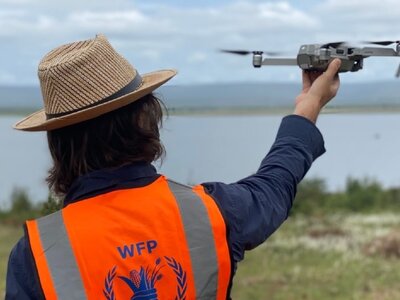WFP Drones
- 15 countries
- strengthened by capacity building for 400+ participants
- 5 regions
- with prepositioned drones
- Over 50 activities
- from mapping to emergency response since 2017
Technology and innovation are key enablers in the World Food Programme (WFP)’s work to save and change lives around the world.
Unmanned aircraft systems (UAS), more commonly known as drones, offer low operating costs and rapid deployment, even in difficult weather conditions. With responsible handling, drones can help monitor food security or the damage caused by disasters like floods, droughts, storms or earthquakes. In emergency situations, they can also provide communications connectivity.
WFP has been developing the use of drones since 2017 to improve preparedness for and response to humanitarian emergencies, encouraging collaboration and capacity building among first responders and government stakeholders worldwide.
Due to safety, privacy and legal considerations, the use of drone technology in humanitarian work requires careful evaluation, cooperation and protocols that focus as much on data protection and public trust as they do on aviation safety.
With support from the United Kingdom’s Foreign, Commonwealth and Development Office (FCDO), WFP is now focusing on three core activities related to drone technology: developing a global-level coordination cell; pre-positioning equipment for humanitarian intervention; and expanding the drones Technical Working Groups to achieve tangible outcomes in four areas: Ethics, Operations and Regulations, Imagery and Connectivity.
With decades of experience in aviation, logistics, and telecommunications, WFP is well positioned to develop, coordinate and implement the standardized, safe, and ethical use of drones for its own operations as well as those of its partners.
WFP drones activities
-
Emergency response
-
In an emergency context, WFP is well positioned to develop, coordinate and deploy drones to assess the situation and support search and rescue operations, communications, community participation, and more. Read more
-
Capacity building
-
WFP has designed a complete UAS training exercise package divided into three modules: Let's COORDINATE (a workshop on strengthening cooperation between national stakeholders), Let's MAP (a practical course on processing data obtained from drones ) and Let's FLY (a hands-on flight exercise). Read more
-
Preparedness
-
As part of its strategy towards improving local food security, WFP is exploring how drone technology can be leveraged for emergency preparedness including monitoring crops and livestock as well as mapping out flood planes to bolster resilience and support local smallholder farmers. Read more
-
Technical Working Groups
-
To help steer the responsible use of drones and build a community of humanitarian stakeholders, WFP set up four technical working groups (TWG) around the following thematic areas: Regulation and Operation, Ethics, Connectivity, and Imagery. Read more

